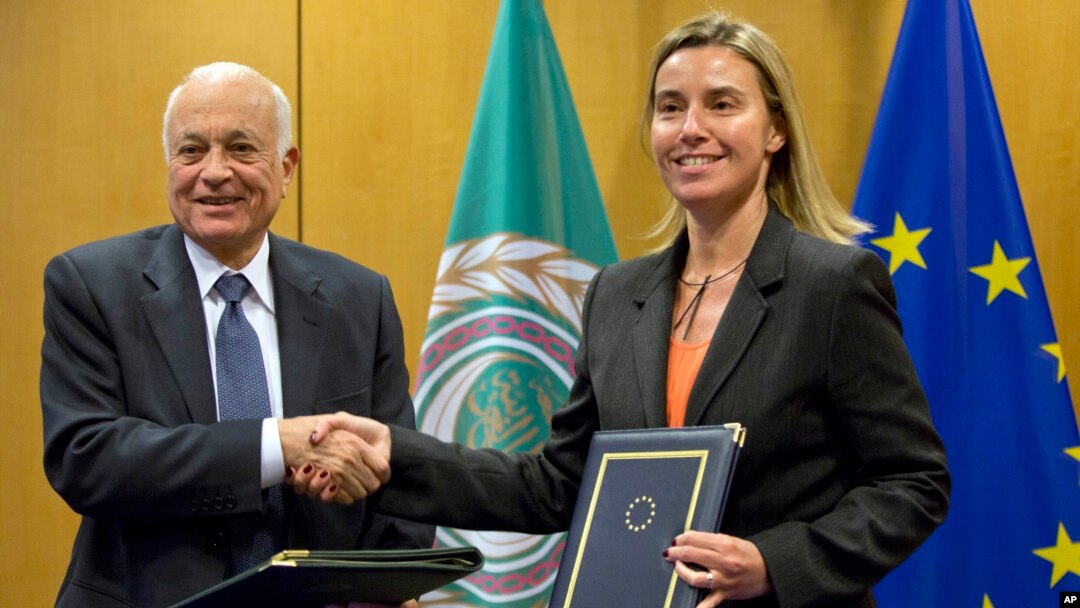The European Union is launching new anti-terrorism projects with Muslim countries and increasing its intelligence sharing in the aftermath of deadly attacks in France and violent confrontations in Belgium.
EU foreign ministers met Monday in Brussels with the Arab League's secretary general, Nabil Elaraby. Afterwards, EU foreign affairs chief Federica Mogherini said the EU will be sharing information on suspected terrorists and possible attacks with many countries throughout the Arab world, Africa and Asia.
"We took a decision within the Foreign Affairs Council to coordinate in a much more active way than it has been the case so far," said Mogherini.
"First of all, with an input to share information, intelligence information, not only within the European Union, but also with other countries around us, starting from the Mediterranean and the Arab world, starting from Turkey, Egypt, [the] Gulf countries, North Africa, but also looking more to Africa and Asia at a certain time," said Mogherini.
The ministers said they would avoid writing new legislation or a prolonged military presence on the streets of Europe.
Following the Paris attack, Belgian security services killed two suspected terrorists during a shoot-out following an investigation into an alleged plot. Similar raids have taken place in Germany and France, while a number of EU states have increased police presence on their streets.
Belgian Foreign Minister Didier Reynders spoke to journalists Monday.
He said information needed to be exchanged inside and outside Europe in order to have proper tracking and to prevent various actions that could occur in Europe.
Watch video report from VOA's Zlatica Hoke:
Your browser doesn’t support HTML5
World Leaders Discuss Global Cooperation Against Terror
Following Monday's meeting, ministers said they were looking at specific projects to launch with key countries, including Turkey, Egypt, Yemen, Algeria and the Gulf countries.
Terror expert Katherine Brown from King’s College London said EU ministers also needed to coordinate addressing the causes of radicalization and the policing of terror activity within Europe.
She said there were hurdles on both fronts. “Within each of the EU member states, the reasons for radicalizing is slightly different - the local community level drivers are quite different.”
And each European state, she said, used different instruments to tackle terrorism.
“Each of the countries have slightly different ways of doing counter-terrorism work generally. Whether it is the remit of the police, or the gendarmerie, or the Justice Ministry. So that creates a whole host of issues for the European Union in generating a coordinated response.”
She said coordination would be a slow process.
Europe, US Officials Warn of Severe Terror Threat
Tracking potential terrorists
British Foreign Secretary Phillip Hammond said Europe was "determined to do what is necessary" to keep the continent safe.
Hammond said officials were looking for better ways to track the movement of potential terrorists, including further sharing of airline passenger lists.
Much of Europe remained tense and on high alert as Belgian Justice Minister Koen Geens said the alleged mastermind in last week's foiled terror attack remains at large.
Geens said the suspect was not among four people arrested in Greece where he was believed to have fled. But Belgian prosecutors still plan to ask Greece to extradite one of those arrested in connection with the thwarted terror strike.
Man behind terror plot
Belgian media have named the wanted mastermind of the plot as Abdelhamid Abaaoud.
The 27-year-old Belgian of Moroccan descent is suspected of leading an Islamic extremist cell in the eastern town of Verviers. Authorities said the cell was about to launch a major terrorist attack on police targets before officers raided their hideout Thursday, killing two in a fierce gun battle.
Meanwhile, Europe is still reeling from terror attacks in Paris earlier this month that killed 12 people at the Charlie Hebdo magazine, a police officer, and four other people at a Jewish supermarket.
French authorities said the two brothers who carried out the Charlie Hebdo massacre and then were killed by police have been buried in secret, unmarked graves in France.
Nature of threat
On Sunday, Rob Wainwright, the director of the European Union law enforcement agency Europol, said a determined police response is underway in the wake of the terrorist attacks earlier this month in France.
"We’ve seen action now in Belgium, in Greece, Berlin and other locations as well, and it shows the nature of the threat we’re facing right now," Wainwright said.
"It’s spread across so many European countries, perpetrated by a community of perhaps thousands of people who have been radicalized on the Internet, by their conflict experience in Syria and Iraq, and many of them have returned to European society with perhaps some of them with the intent and capability to carry out the attack," he added.
In an appearance on the ABC program This Week, Wainwright said it is not just the scale of the problem police are facing that presents challenges, as the nature of the threat has changed since the September 11, 2001, attacks in the United States.
He said there is no clear command-and-control structure. However, he added, there is a concerted effort underway for greater cooperation among counterterrorism services, including the sharing of intelligence and the tracking of terrorist financing, illicit firearms and monitoring terrorist activities online.
Victor Beattie from Washington and Selah Hennessy from London contributed to this report .


